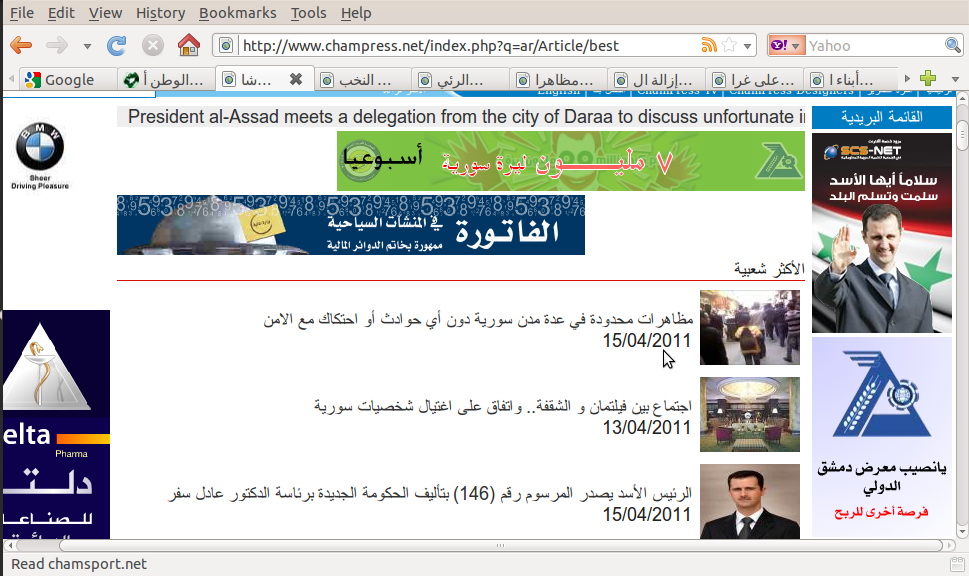Syrian Private Websites are Far From Independent


Analysis: New media in Syria remains in thrall to the regime
By Shahine Mroue
The apple of Syria’s private news media has not fallen very far from the state-controlled tree. A tangle of propaganda has always prevented professional media from serving the public, as well as the journalists themselves.
The best examples of this among of the excess of websites that have sprung up in the last 10 or so years since the internet was allowed in Syria are sites like Cham Press, Watan-online, Syria News, DP-news and others.
These websites even go as far as calling themselves independent.
But the truth is that most of the electronic news media in Syria is owned, directly or indirectly, by powerful officials or influential businessmen – although it’s quite hard to differentiate between the two in Syria. As sponsors, they interfere directly in the editorial policy of websites, which tend to adhere to the state-controlled line.
For example, it is very natural, in Syria, for the son of the ex-minister of defence to attend the weekly editorial meeting of the Souriaalghad website, where he happens to pay the employees’ salaries. It is also natural for an editor in DP-news not to mention the name of his actual boss, who has intelligence affiliations, during a seminar about electronic media in Syria. The editor in chief of Cham Press is used in official campaigns of the ministry of foreign affairs. And one has to wonder if a certain Lebanese newspaper refrained from covering the current popular uprising in Syria because its correspondent in Syria happens to also be the editor in chief of Watan-online, a website close to the regime.
Last Friday, the day that marked the biggest demonstrations so far, DP-news (a semi-state run website) published one piece entitled “Banyas bids farewell to its martyrs” – a reference to the people killed in protests in that region – but without mentioning any of the calls for freedom and the slogans criticising the security forces and intelligence apparatuses, which were reported by the international news agencies and satellite TV channels.
And while Facebook is bubbling with pages about the revolution against Bashar Assad, and others demanding the release of political detainees, the editor of DP-news presented a page titled “Together for preparing Syria for the World Cup 2014”.
The irony here is that everybody knows that one of the reasons of failure of the Syrian football team is its administrative corruption. It is a reflection of the failure of the political-security team in building a modern democratic Syrian state, the very thing that brought along the popular uprising.
Cham Press did cover the events of the “Friday of Resolve” as the participators called it. But how? Its correspondent reported from Aleppo that the streets were “buzzing with family gatherings in the open air”, and that “the smoke of barbecue grills fills the atmosphere”. The so-called professional journalist did not forget to dismiss other media which were busy reporting the names of detainees’ names and broadcasting video clips of the Syrian uprising in several cities, including Aleppo. The Cham Press reporter said, “There is false news about thousands of protestors in the streets of Aleppo.”
Despite the fact that one of the characteristics of the electronic media is its interactive nature, these websites enforce harsh censorship on the readers’ comments. The editors of Watan-online, Cham News, and Syria News would not dare publish any comment that criticises the authorities, even though those same words, and harsher ones, are being shouted out loud in the protests of Der’aa, Banyas, Douma, Latkia, Aleppo, Damascus and others.
These semi-official websites abide by the regime’s strategy of keeping the Syrian uprising hidden, in addition to kicking out and detaining foreign and independent journalists, to allow the authorities to monopolise the internet with false or one-sided stories. Some websites have even gone as far as starting new pages on Facebook and Twitter to post news that give the impression of a “normal life” in Syria and that “the people are one around the one leader Assad”.
The call today for a free Syrian media is not at all a revolutionary or intellectual luxury. It is at the heart of the legitimate demands that Syrians have been marching and dying for, for a month now.
The hypocritical media has even become a kitschy advertisement (see the accompanying picture) whereby a slogan supporting Assad comes above an ad for the national lottery on Cham Press. And while the lottery card holds a chance of winning, based on luck and mathematical probabilities, the regime’s card, which is half-a-century old, does not offer anything except a guaranteed loss.
